After completing a slew of events in San Francisco in four days, including a China-U.S. summit and the 30th Asia-Pacific Economic Cooperation (APEC) Economic Leaders' Meeting, Chinese President Xi Jinping returned to Beijing on Saturday evening.
In briefing the media about the Chinese leader's trip to the United States starting from Tuesday, Chinese Foreign Minister Wang Yi said it has added stability to the China-U.S. relations, brought new impetus to the Asia-Pacific cooperation and injected positive energy into the international and regional landscape.
Here are five key takeaways from the Chinese president's trip.
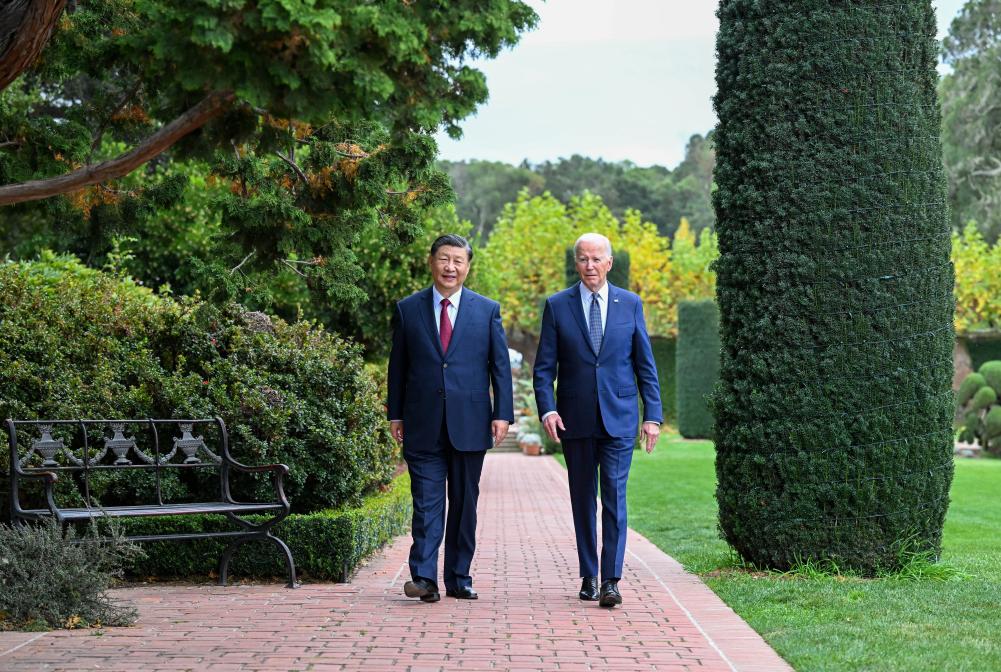
Chinese President Xi Jinping and U.S. President Joe Biden take a walk after their talks in the Filoli Estate in the U.S. state of California, November 15, 2023. /Xinhua
Chinese President Xi Jinping and U.S. President Joe Biden take a walk after their talks in the Filoli Estate in the U.S. state of California, November 15, 2023. /Xinhua
1. Xi-Biden summit
The closely-watched high-stakes meeting between Xi and his U.S. counterpart Joe Biden took place on Wednesday at the Filoli Estate, a country house approximately 40 kilometers south of San Francisco, California.
In his opening remarks of bilateral talks, Xi said the world is big enough for China and the U.S. to succeed, and one country's success is an opportunity for the other.
He called on the two countries to assume a new vision and build together five pillars for bilateral relations – developing a right perception, managing disagreements effectively, jointly advancing mutually beneficial cooperation, shouldering responsibilities as major countries, and promoting people-to-people exchanges.
During the talks, the two presidents agreed to promote and strengthen bilateral dialogue and cooperation in such areas as China-U.S. government talks on AI and the establishment of a working group on counternarcotics cooperation.
They agreed to resume high-level communication between the two militaries, and to work toward a significant further increase in scheduled passenger flights between the two countries early next year.
The summit came at a critical juncture when the international community presses for a stable China-U.S. relationship.
Calling the Xi-Biden summit "the most important diplomatic event of the year," Chairman of the Kuhn Foundation Robert Lawrence Kuhn said the two leaders established a floor under bilateral relations, which will be a huge contribution to world peace and prosperity.
"Then, both countries can carefully build back up by finding specific areas of agreement and mutual benefit," said Kuhn.
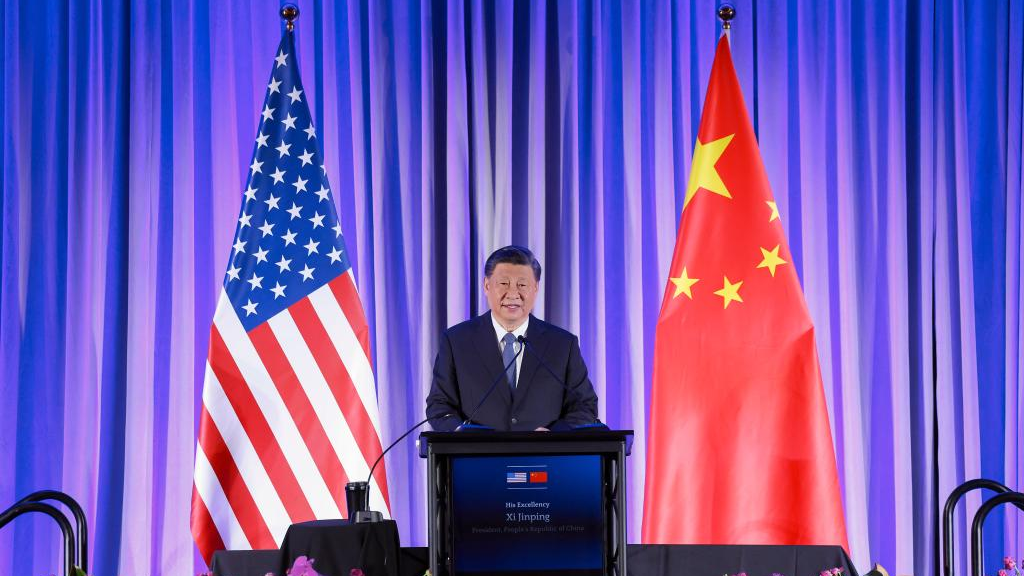
Chinese President Xi Jinping delivers a speech at a welcome dinner in San Francisco, the United States, November 15, 2023. /Xinhua
Chinese President Xi Jinping delivers a speech at a welcome dinner in San Francisco, the United States, November 15, 2023. /Xinhua
2. 'A closer bond between our peoples'
At a welcome dinner on Wednesday evening, Xi stressed the importance of the role of people in China-U.S. relations.
The foundation of China-U.S. relations was laid by the two peoples, the door was opened by the two peoples, the stories were written by the two peoples, and the future will be created by the two peoples, Xi told the roughly 400 guests.
"The more difficulties there are, the greater the need for us to forge a closer bond between our peoples and to open our hearts to each other, and more people need to speak up for the relationship," he said.
At the dinner, Xi extended a warm invitation to the American people, expressing his welcome for more U.S. governors, Congressional members, and people from diverse backgrounds to visit China.
He also announced that China is ready to invite 50,000 young Americans to China on exchange and study programs in the next five years.
"I'm super excited. Getting that opportunity would be such a blast!" Isaiah Long, an American student, told CGTN.
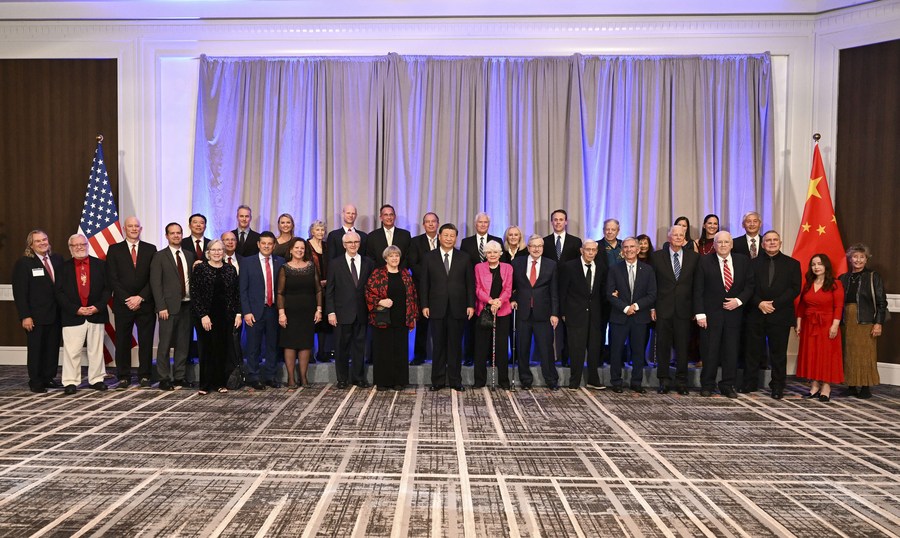
Chinese President Xi Jinping meets and poses for a group photo with representatives of friendly personages before attending a welcome dinner in San Francisco, the United States, November 15, 2023. /Xinhua
Chinese President Xi Jinping meets and poses for a group photo with representatives of friendly personages before attending a welcome dinner in San Francisco, the United States, November 15, 2023. /Xinhua
3. "The 'next China' is still China"
In a written speech delivered to the APEC CEO Summit on Thursday, Xi expressed firm confidence in China's economy.
China remains the most powerful engine of global growth, and will generate one-third of global growth this year, he said.
"Just as some leaders of the business community have said, China has become a synonym of the best investment destination, and that the 'next China' is still China," Xi said.
"We have the confidence in, and even more capability of, achieving long-term and stable growth, and through our development we will continue to provide the world with new growth momentum and opportunities," he said.
Earlier in November, the International Monetary Fund (IMF) said China's real gross domestic product (GDP) is projected to grow by 5.4 percent in 2023, reflecting an upward revision of 0.4 percentage points relative to its World Economic Outlook released in October.
China is a key anchor for stability in the Asia-Pacific region and an important driver of global economic recovery, said Koh King Kee, president of the Center for New Inclusive Asia, a Malaysian think tank.
"You can't live without China's market these days for any multinational or any company that claims itself to be a global player," said the expert.
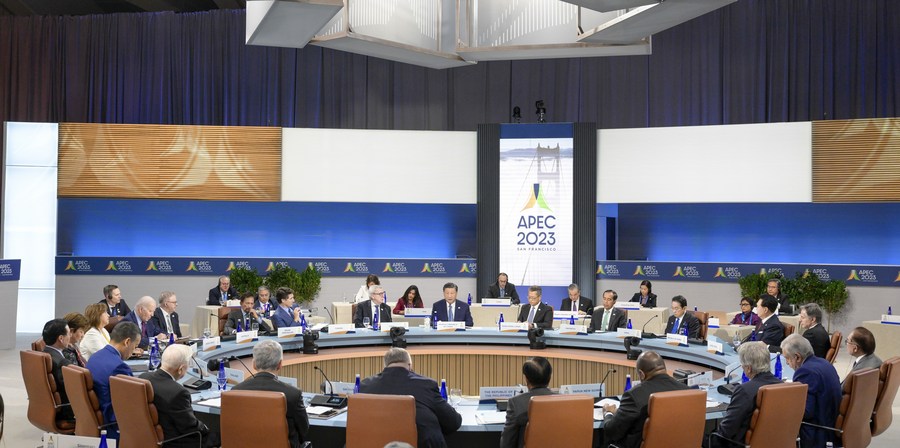
Chinese President Xi Jinping delivers a speech titled "Staying True to APEC Founding Mission and Enhancing Unity and Cooperation to Jointly Promote High-Quality Growth in the Asia-Pacific" at the 30th Asia-Pacific Economic Cooperation (APEC) Economic Leaders' Meeting in San Francisco, the United States, November 17, 2023. /Xinhua
Chinese President Xi Jinping delivers a speech titled "Staying True to APEC Founding Mission and Enhancing Unity and Cooperation to Jointly Promote High-Quality Growth in the Asia-Pacific" at the 30th Asia-Pacific Economic Cooperation (APEC) Economic Leaders' Meeting in San Francisco, the United States, November 17, 2023. /Xinhua
4. Next 'golden 30 years' for Asia-Pacific
When addressing the 30th APEC Economic Leaders' Meeting on Friday, Xi called on APEC members to stick to innovation, openness, and green and inclusive development in promoting regional cooperation and for the region to usher in another "golden 30 years."
"We, the leaders of Asia-Pacific economies, must think very hard as to what kind of Asia-Pacific region we should have by the middle of this century, what we should do to usher in another 'golden 30 years' for the region, and how we can bring out the best of APEC in this process," he said.
Since its inception, APEC has become a dynamic engine of economic growth and one of Asia Pacific's most important regional forums. Its 21 member economies are home to around 2.95 billion people, representing approximately 62 percent of world GDP and 48 percent of world trade in 2021.
"Chinese modernization will bring the world more and greater opportunities for the modernization of all countries," Xi said in the speech.
China's commitment to contributing to the modernization of all countries demonstrates a cooperative and inclusive mindset, said Rusa Bagirishya, a Rwandan expert in economic and political affairs.
"By inviting all parties to participate in global development initiatives and advocating for unity and cooperation, China plays a vital role in creating a golden future for the Asia-Pacific," said Bagirishya.
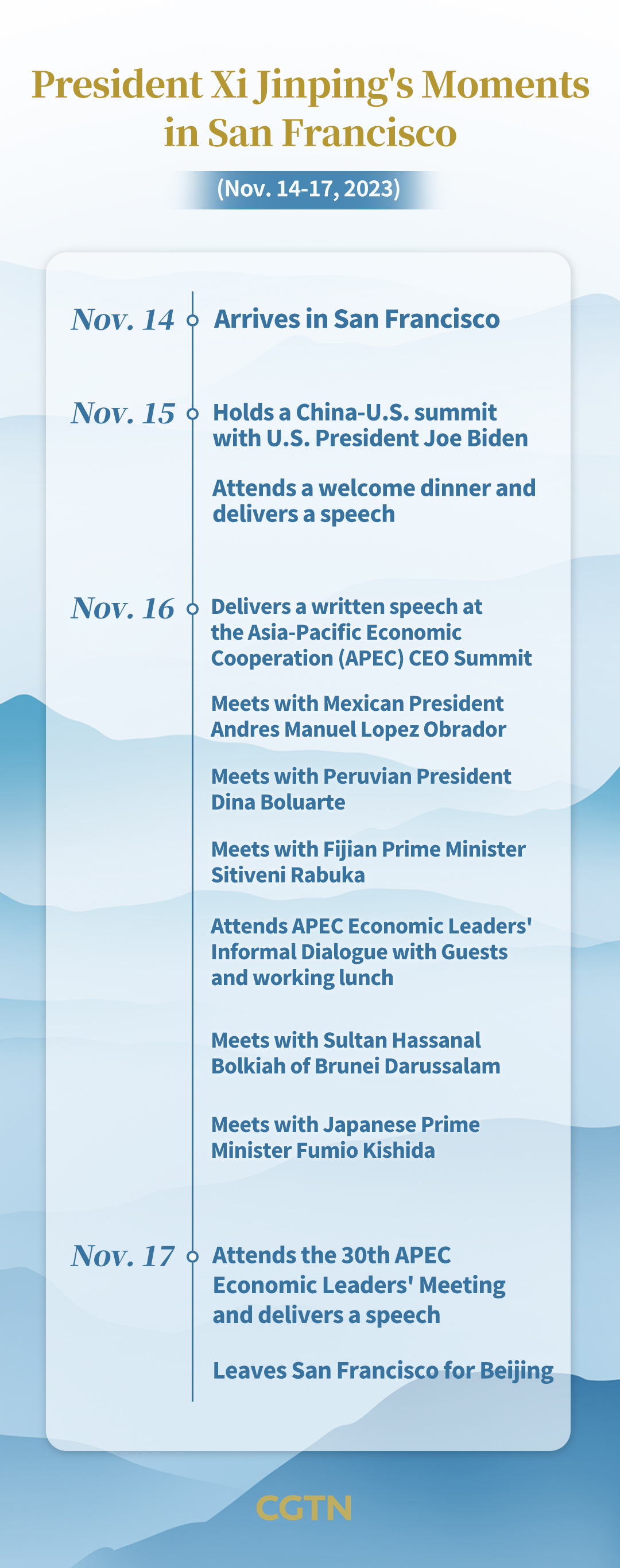
5. Bilateral meetings with leaders of Mexico, Peru, Fiji, Brunei and Japan
During the visit, Xi also held separate meetings with other leaders on Thursday on the sidelines of the 30th APEC Economic Leaders' Meeting.
When meeting his Mexican counterpart Andres Manuel Lopez Obrador, Xi called for expanding China-Mexico cooperation in finance, electric vehicles and other emerging industries, and urged the two sides to make good use of the inter-governmental cooperation mechanism and deepen cooperation in traditional areas such as infrastructure construction.
China supports Peru in hosting the 2024 APEC Economic Leaders' Meeting, and stands ready to engage in close communication and coordination with Peru to reap new results in APEC cooperation, making new contributions to the economic recovery and long-term development of the Asia-Pacific region and to the building of an Asia-Pacific community with a shared future, Xi told Peruvian President Dina Boluarte.
During his meeting with Fijian Prime Minister Sitiveni Rabuka, Xi said China has developed relations with Pacific island countries in a candid manner, without selfish motives or targeting any third party, and urged both sides to strengthen mutual assistance within the framework of South-South cooperation.
China and Brunei should make joint efforts to make positive progress in joint maritime development and jointly safeguard peace and stability in the South China Sea, said Xi while meeting Brunei's Sultan Hassanal Bolkiah.
During their meeting, Xi and Japanese Prime Minister Fumio Kishida reaffirmed the positioning of comprehensively advancing the strategic and mutually beneficial relations between China and Japan.






